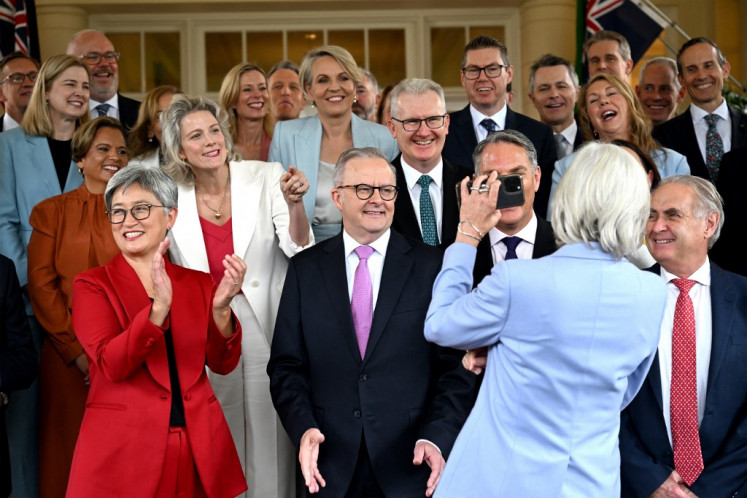Commentary: Remembering Cak Nur, our last great Muslim intellectual?
Just by his sheer appearance, you could tell that Nurcholish Madjid, widely known as Cak Nur, was a learned man
Change text size
Gift Premium Articles
to Anyone

J
ust by his sheer appearance, you could tell that Nurcholish Madjid, widely known as Cak Nur, was a learned man. When he passed away on Aug. 29, 2005, the nation eulogized his departure by noting his contributions as a Muslim intellectual who solidified the theological foundation of our decades-old secularism.
He was not, as many would argue, the first to say that Islam is compatible with nationalism and democracy, but he was the first to articulate it in such a scholarly way that the very idea of turning the country into an Islamic state became not only outdated and irrelevant, but also unholy.
He was a great man, known for his patience in dealing with his harshest critics ' many of whom were his own colleagues, who once anointed him 'the Young Natsir', referring to M. Natsir, the influential Muslim ideologist who led the Islamist Masyumi Party before its banning by Indonesia's first president Sukarno. Cak Nur was revered by his friends and respected by his enemies.
Nine years after his passing, I still feel his absence.
I still regret the fact that I never actually met him. I wish I could have, but I never did. He was always my inspiration. I didn't read all his books, but the few of his articles that I did read led me to all the Western literature that helped shape my views about Islam.
He was the reason I attended the State Institute of Islamic Studies (IAIN, now Syarif Hidayatullah State Islamic University or UIN) in Jakarta, where he received his bachelor degree and later became a professor. But he never taught me and for some reason I never had the chance to attend his lectures.
The closest I came to meeting Cak Nur was when my father, a piano tuner, asked me to come with him to Cak Nur's residence in Cibubur, West Java. He was not at the house at the time. We only met his wife, and I remember my father told her that I was a fan of her husband and wanted to meet him.
She only smiled and told us that Cak Nur didn't play the piano.
Cak Nur was not an Ivory Tower thinker. He was an intellectual par excellence, well known for his erudition and integrity. He was well versed in both Islamic studies and Western philosophy.
This is also why I am constantly conscious of his absence: While the nation is grappling with the rise of religious intolerance and extremism, not a single Muslim scholar today seems to be able to fill
his shoes.
I realize I may be suffering from the Golden Age syndrome here. But it is not easy to dismiss the perception that today's Muslim intellectuals are losing their clout, that their voices have slowly become fainter.
One may argue that society has changed and, with the rise of social media, that so-called public intellectuals may no longer exist. Public debates no longer only take place at cultural centers or on mass media, but also on Twitter, where an intellectual could easily make a faux pas and instantly shatter their image. And, of course, the Islamists are often louder on the web.
But is that really the case?
Syafii Maarif, one of the remaining intellectuals from Cak Nur's generation, is still gaining the respect of many, but he is not on Twitter and is known more as an advocate of pluralism than a political thinker. His influence among members of Indonesia's second-largest Islamic organization, Muhammadiyah, has now been overshadowed by his successor, Din Syamduddin, who presents himself more as a leader than an intellectual.
I doubt if there is any young Muslim scholar who could match Cak Nur's charisma and influence. Ulil Abshar Abdalla might have had the chance before he joined the graft-tainted Democratic Party. Others, including Ahmad Sahal, who is currently pursuing a doctoral degree in the United States, have rarely made public appearances and are probably only popular on social media.
Could this be a problem? I hope it won't be.
Indonesia has decided to live in a fully fledged democracy and embrace the kind of Islam that values civil liberty with the selection of president-elect Joko 'Jokowi' Widodo in July. But the threat of religious fascism persists, and the void that was left by the passing of Cak Nur nine years ago remains unfilled.
I don't know if that void should or will ever be filled. Society may have become more open-minded with the help of technology, which has clearly taken our fledgling democracy to a whole new level. And maybe we no longer need a towering figure like Cak Nur to preserve our political legacy as one big nation for all, regardless of ethnicity and religion.
Whatever the case, Cak Nur and his ideas ' 'Islam yes, Islamic party no!' ' shall not be forgotten. And as we now enter a new era of democracy, where the power of civil society has grown stronger than ever, we shall perhaps remember him as Indonesia's last great Muslim intellectual.
_____________________
The author is a staff writer at The Jakarta Post.









